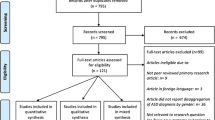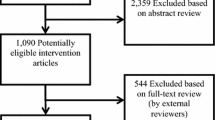Abstract
Although informed consent is critical for all research, there is increased ethical responsibility as individuals with intellectual or developmental disabilities (IDD) become the focus of more clinical trials. This study examined decisional capacity for informed consent to clinical trials in individuals with fragile X syndrome (FXS). Participants were 152 adolescents and adults (80 males, 72 females) with FXS who completed a measure of decisional capacity and a comprehensive battery of neurocognitive and psychiatric measures. Females outperformed males on all aspects of decisional capacity. The ability to understand aspects of the clinical trial had the strongest association with the ability to appreciate and reason about the decision. Scaffolding improved understanding, suggesting researchers can take steps to improve decisional capacity and the informed consent process.





Similar content being viewed by others
References
Appelbaum, P. S. (2007). Assessment of patients’ competence to consent to treatment. New England Journal of Medicine, 357(18), 1834–1840.
Appelbaum, P. S., & Grisso, T. (2001). The MacArthur Competence Assessment Tool for clinical research (MacCAT-CR). Sarasota, FL: Professional Resource Press.
Appelbaum, P. S., & Lidz, C. (2008). The therapeutic misconception. In E. J. Emanuel, C. Grady, R. A. Crouch, R. K. Lie, F. G. Miller & D. Wendler. (Eds.), The Oxford textbook of clinical research ethics. New York: Oxford University Press.
Bear, M. F., Huber, K. M., & Warren, S. T. (2004). The mGluR theory of fragile X mental retardation. Trends in Neurosciences, 27(7), 370–377.
Becker, H., Roberts, G., Morrison, J., & Silver, J. (2004). Recruiting people with disabilities as research participants: Challenges and strategies to address them. Mental Retardation, 42(6), 471–475.
Bruininks, R. H., Woodcock, R. W., Weatherman, R. F., & Hill, B. K. (1996). Scales of independent behavior—Revised comprehensive manual. Itasca, IL: Riverside Publishing.
Burket, J. A., Herndon, A. L., Winebarger, E. E., Jacome, L. F., & Deutsch, S. I. (2011). Complex effects of mGluR5 antagonism on sociability and stereotypic behaviors in mice: Possible implications for the pharmacotherapy of autism spectrum disorders. Brain Research Bulletin, 86(3–4), 152–158.
Cameron, L., & Murphy, J. (2007). Obtaining consent to participate in research: The issues involved in including people with a range of learning and communication disabilities. British Journal of Learning Disabilities, 35(2), 113–120.
Carey, E., & Griffiths, C. (2017). Recruitment and consent of adults with intellectual disabilities in a classic grounded theory research study: Ethical and methodological considerations. Disability & Society, 32(2), 193–212.
Cea, C. D., & Fisher, C. B. (2003). Health care decision-making by adults with mental retardation. Mental Retardation, 41, 78–87.
Cleaver, S., Ouellette-Kuntz, H., & Sakar, A. (2010). Participation in intellectual disability research: A review of 20 years of studies. Journal of Intellectual Disability Research, 54(3), 187–193.
Dalton, A. J., & McVilly, K. R. (2004). Ethics guidelines for international, multicenter research involving people with intellectual disabilities. Journal of Policy and Practice in Intellectual Disabilities, 1(2), 57–70.
de Vrij, F. M., Levenga, J., van der Linde, H. C., et al. (2008). Rescue of behavioral phenotype and neuronal protrusion morphology in Fmr1 KO mice. Neurobiology Disease, 31(1), 127–132.
Delis, D. C., Kaplan, E., & Kramer, J. H. (2001). Delis–Kaplan executive function system™. San Antonio, TX: The Psychological Corporation.
Department of Health. (2014). The Belmont Report. Ethical principles and guidelines for the protection of human subjects of research. The Journal of the American College of Dentists, 81(3), 4.
Dunn, L. B., Nowrangi, M. A., Palmer, B. W., Jeste, D. V., & Saks, E. R. (2006). Assessing decisional capacity for clinical research or treatment: A review of instruments. The American Journal of Psychiatry, 163, 1323–1334.
Dye, L., Hare, D. J., & Hendy, S. (2007). Capacity of people with intellectual disabilities to consent to take part in a research study. Journal of Applied Research in Intellectual Disabilities, 20(2), 168–174.
Dye, L., Hendy, S., Hare, D. J., & Burton, M. (2004). Capacity to consent to participate in research—A recontextualization. British Journal of Learning Disabilities, 32(3), 144–150.
Esbensen, A. J., Rojahn, J., Aman, M. G., & Ruedrich, S. (2003). Reliability and validity of an assessment instrument for anxiety, depression, and mood among individuals with mental retardation. Journal of Autism and Developmental Disorders, 33, 617–629.
Fisher, C. B. (2003). Goodness-of-fit ethic for informed consent to research involving adults with mental retardation and developmental disabilities. Developmental Disabilities Research Review, 9(1), 27–31.
Fisher, C. B., Cea, C. D., Davidson, P. W., & Fried, A. L. (2006). Capacity of persons with mental retardation to consent to participate in randomized clinical trials. American Journal of Psychiatry, 163(10), 1813–1820.
Freedman, R. I. (2001). Ethical challenges in the conduct of research involving persons with mental retardation. Mental Retardation, 39(2), 130–141.
Goldsmith, L., Skirton, H., & Webb, C. (2008). Informed consent to healthcare interventions in people with learning disabilities—An integrative review. Journal of Advanced Nursing, 64(6), 549–563.
Grisso, T., & Appelbaum, P. S. (1998). Assessing competence to consent to treatment: A guide for physicians and other health professionals. Oxford: Oxford University Press.
Grisso, T., & Appelbaum, P. S. (2006). Appreciating anorexia: Decisional capacity and the role of values. Philosophy, Psychiatry, & Psychology, 13(4), 293–297.
Iacono, T., & Murray, V. (2003). Issues of informed consent in conducting medical research involving people with intellectual disability. Journal of Applied Research in Intellectual Disabilities, 16(1), 41–51.
Jønch, A. E., & Jacquemont, S. (2017). Reflections on clinical trials in Fragile X Syndrome. In Fragile X syndrome (pp. 419–441).
Loesch, D. Z., Huggins, R. M., & Hagerman, R. J. (2004). Phenotypic variation and FMRP levels in fragile X. Mental Retardation and Developmental Disabilities Research Reviews, 10(1), 31–41.
Lord, C., Rutter, M., Dilavore, P. C., Risi, S., Gotham, K., & Bishop, S. L. (2012). Autism diagnostic observation schedule (2nd ed.). Los Angeles, CA: Western Psychological Services.
McDonald, K. E. (2012). We want respect”: Adults with intellectual and developmental disabilities address respect in research. American Journal on Intellectual and Developmental Disabilities, 117(4), 263–274.
McDonald, K. E., & Kidney, C. A. (2012). What is right? Ethics in intellectual disabilities research. Journal of Policy and Practice in Intellectual Disabilities, 9(1), 27–39.
McDonald, K. E., Kidney, C. A., & Patka, M. (2013). ‘You need to let your voice be heard’: Research participants’ views on research. Journal of Intellectual Disability Research, 57(3), 216–225.
Michalon, A., Sidorov, M., Ballard, T. M., et al. (2012). Chronic pharmacological mGlu5 inhibition corrects fragile X in adult mice. Neuron, 74(1), 49–56.
Mitty, E. L. (2012). Decision-making and dementia. In Try this: Best practices in nursing care to older adults with dementia (D, 9).
Nugent, A. C., Miller, F. G., Henter, I. D., & Zarate, C. A. (2017). The ethics of clinical trials research in severe mood disorders. Bioethics, 31(6), 443–453.
Palmer, B. W., Harmell, A. L., Pinto, L. L., Dunn, L. B., Kim, S. Y., Golshan, S., & Jeste, D. V. (2017). Determinants of capacity to consent to research on Alzheimer’s disease. Clinical Gerontologist, 40(1), 24–34.
Peisah, C., Sorinmade, O. A., Mitchell, L., & Hertogh, C. M. (2013). Decisional capacity: Toward an inclusionary approach. International Psychogeriatrics, 25(10), 1571–1579.
Powers, L., Dinerstein, R., & Holmes, S. 2005. Self-advocacy, self-determination, social freedom, and opportunity. In National goals and research for people with intellectual and developmental disabilities (pp. 257–287).
Roid, G. H. (2003). Stanford Binet intelligence scales (SB5) (5th ed.). Itasca, IL: Riverside Publishing.
Rutter, M., Bailey, A., & Lord, C. (2003). Social communication questionnaire. Los Angeles, CA: Western Psychological Services.
Sansone, S. M., Schneider, A., Bickel, E., Berry-Kravis, E., Prescott, C., & Hessl, D. (2014). Improving IQ measurement in intellectual disabilities using true deviation from population norms. Journal of Neurodevelopmental Disorders, 16, 1–14.
Sheslow, D., & Adams, W. (2003). Wide range assessment of memory and learning (2nd ed.). Lutz, FL: Psychological Assessment Resources, Inc.
Shogren, K. A., Wehmeyer, M. L., Uyanik, H., & Heidrich, M. (2017). Development of the Supported Decision Making Inventory System. Intellectual and Developmental Disabilities, 55(6), 432–439.
Tam, N. T., Huy, N. T., Thoa, L. T. B., Long, N. P., Trang, N. T. H., Hirayama, K., & Karbwang, J. (2015). Participants’ understanding of informed consent in clinical trials over three decades: Systematic review and meta-analysis. Bulletin of the World Health Organization, 93, 186–198H.
Thomas, A. M., Bui, N., Perkins, J. R., Yuva-Paylor, L. A., & Paylor, R. (2012). Group I metabotropic glutamate receptor antagonists alter select behaviors in a mouse model for fragile X syndrome. Psychopharmacology, 219(1), 47–58.
Walmsley, J. (2001). Normalisation, emancipatory research and inclusive research in learning disability. Disability & Society, 16(2), 187–205.
Wang, S. B., Wang, Y. Y., Ungvari, G. S., Ng, C. H., Wu, R. R., Wang, J. & Xiang, Y. T. (2017a). The MacArthur Competence Assessment Tools for assessing decision-making capacity in schizophrenia: A meta-analysis. Schizophrenia Research 183, 56–63.
Wang, Y. Y., Wang, S. B., Ungvari, G. S., Yu, X., Ng, C. H., & Xiang, Y. T. (2017b). The assessment of decision-making competence in patients with depression using the MacArthur competence assessment tools: A systematic review. Perspectives in Psychiatric Care. 54, 206–211
Woodcock, R. W., McGrew, K. S., & Mather, N. (2001, 2007). Woodcock Johnson III tests of achievement. Rolling Meadows, IL: Riverside Publishing.
Yan, Q. J., Rammal, M., Tranfaglia, M., & Bauchwitz, R. P. (2005). Suppression of two major Fragile X syndrome mouse model phenotypes by the mGluR5 antagonist MPEP. Neuropharmacology, 49(7), 1053–1066.
Acknowledgments
We are grateful to all of the individuals with FXS and their caregivers who participated in this study.
Funding
This study was funded by a grant from the Eunice Kennedy Shriver National Institute for Child Health and Human Development (R01HD071987-01A1). The findings and conclusions in this report are those of the authors and do not necessarily represent the official position of the National Institutes of Health.
Author information
Authors and Affiliations
Contributions
ACW contributed to the design of the study, oversaw data collection, and drafted the majority of the manuscript; AW provided all statistical analysis; MR contributed to the design and leadership of the study; AV, KM, AE, and MD collected a majority of the data and contributed to the oversight of the study; PSA provided expert consultation on the use of the MacCAT-CR; DBB conceptualized the study and provided leadership and oversight. All authors approved of the final version of the manuscript.
Corresponding author
Ethics declarations
Conflict of interest
None of the authors have any conflict of interests to declare.
Ethical Approval
All procedures performed in studies involving human participants were in accordance with the ethical standards of the institutional and/or national research committee and with the 1964 Helsinki declaration and its later amendments or comparable ethical standards.
Informed Consent
Informed consent and/or assent were obtained from all individual participants included in the study.
Additional information
Publisher’s Note
Springer Nature remains neutral with regard to jurisdictional claims in published maps and institutional affiliations.
Rights and permissions
About this article
Cite this article
Wheeler, A.C., Wylie, A., Raspa, M. et al. Decisional Capacity for Informed Consent in Males and Females with Fragile X Syndrome. J Autism Dev Disord 50, 1725–1747 (2020). https://doi.org/10.1007/s10803-019-03930-4
Published:
Issue Date:
DOI: https://doi.org/10.1007/s10803-019-03930-4




